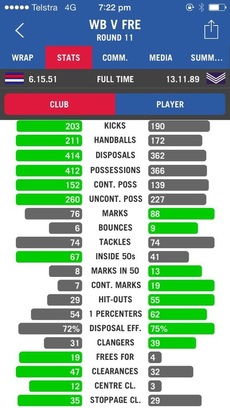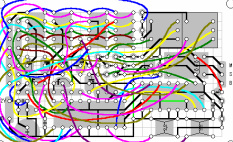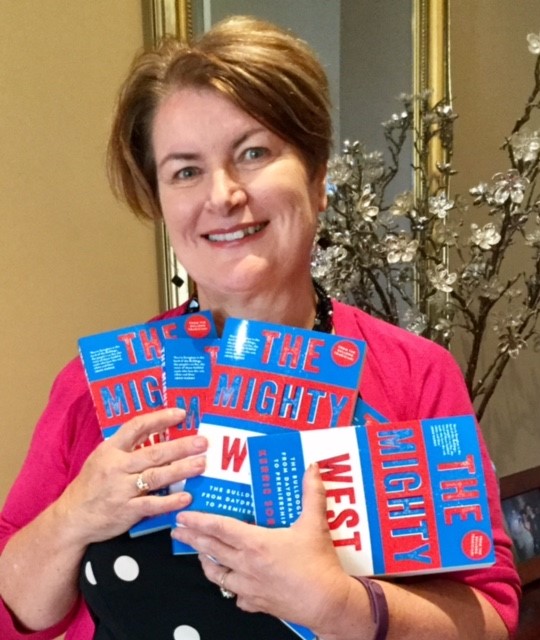 Last week I wrote about the many shades of losing, and the tangled set of emotions that follows in their wake. One of the unique delights in following the Bulldogs is their capacity to endlessly expand this repertoire. Sunday's loss to Freo demonstrated that I'd carelessly overlooked that endearing, but durable, category: A Loss Where You Do Lots of Things Right But Still Lose By Seven Bloody Goals. (I'm looking to trademark it soon). There's a certain consolation in being able to blame a loss on an apparent lack of effort. You can get sanctimoniously riled up at the perceived failure of the team to 'man up' or 'get on him!' (Though in these more complex, less innocent times, a new age supporter might explode with: 'For god's sake, is it too much to ask that we adhere to our structures!') Our loss to Freo, as the depressing, almost unbelievable, statistics above show, was not a loss which neatly fits a 'lack of endeavour' explanation. In fact, the loss might have been less excruciating if there wasn't abundant evidence that our players, who outdid Freo in most measures, were trying (actually, very trying). It's a unique form of suffering to know that so much effort was being expended, so much hard graft was going on. And yet all day the result seemed inevitable, as it has for the last dozen or so times we've faced a Ross Lyon-coached football team. However, here's a well-known fact: 98 per cent of statistics are just made up on the spot. The numbers we saw after the game might not have been out and out inventions, but so much of what we saw as spectators wasn't reflected in the statistical tables. They show, for example, that Fremantle had more 'clangers' than us. I don't know how a 'clanger' is defined, but it appears, if this statistic is to be believed, that 'ceaseless bombing towards seemingly nobody in the forward line' is not included. Nor do the stats reflect our disposal efficiency of 72 per cent (are you kidding me???!!), which was only slightly less than our opponents, rated at 75. I'm suggesting, therefore, the introduction of a 'Catastrophe Performance Index' - or CPI. This should capture all those occasions when the Dogs handballed to the feet of their team-mates, kicked into the man on the mark, or lacked the vision to spot a rare good option. Bonus points would accumulate at moments where, after applauding a heroic effort by Dale Morris or Easton Wood to fling themselves in the path of a Freo attack, you then groan with horror as the next kick is an ugly floater straight back from where it came. Drilled passes to a certain extremely tall ruckman of the purple persuasion would also score highly (in fairness, Sandilands and his fellow giants seemed to all congregate in our forward line. They probably concluded, with justification, that this was no danger zone, but rather a haven in which to merrily feast on our lack of forward talent). This new performance measure (I'm trademarking it too) would provide a more complete, well-rounded,and satisfying picture of Sunday's match.  CPI analysis of Sunday's match CPI analysis of Sunday's match The CPI could be rendered in complex diagrams, accompanied by demented whiteboard squiggles such as this early prototype. Handily, it also fulfills the purpose of bamboozling the media and fans alike in one deft manouevre. Coaching personnel could further befuddle us with earnest explanations of how the CPI had an impactful relationship with our Adherence to Structures Ratio, divided by the Quality Forward Entry Matrix, but tripled by the Bulldogs Misfortune Variability Quotient. Alternatively, we could just concentrate on one simple figure that caused all Bulldog hearts to sink when it appeared on the screen at three quarter time. We had gone into the forward line 54 times and scored five goals. I didn't really need to consult the Catastrophe Performance Index to see that this was not a good thing, or to feel the pain and frustration at seeing our repeated toil - our patent desire to win - yield such pitiful rewards. From that point, the last quarter seemed interminable. In happier days, last quarters used to last forever because we were usually in the lead, and I was breathlessly watching the clock and, as a seasoned Bulldogs veteran fan, calculating whether it could be snatched off us in new world-record time. (Yes, I was the person who once announced, with completely mis-placed confidence, 'Melbourne will need to score three goals in less than three minutes to snatch this game, which is impossible,' only to see this exact scenario unfold.). But now, the last quarter was dragging from the sheer boredom of the game, the seeming impossibility of us scoring, and the often unwatchable spectacle of ugly, roiling packs milling together on the field. I found myself drifting off into some of the eccentric reveries that distract me in times like these. Asking the big questions. Why, for example, are small forwards somehow so intrinsically annoying? I waste further, not so valuable, moments, compiling a mental list of the most irritating (this has been triggered, of course, by the presence of Hayden Ballantyne). He would, I'm sure, rate in the All Time Top Twenty but how would he compare against the 'non-giants' of the genre? Steven Milne would, of course, have to go close to patron saint of this esteemed collective. Yet, I mused, Philip Matera, Darren Bewick, Jeff Farmer and Ronnie Burns surely deserved honourable mentions. I was just at the point of an internal debate on where Eddie Betts and Jake King would feature in this illustrious pantheon when I became vaguely aware that a commotion, or at least a minor kerfuffle, was brewing around me. Not, unfortunately, because I'd missed a flurry of scintillating play, a surge of dynamic goals (any goals are dynamic at present), and an unlikely come from behind rally. This was the rumbling, restive discontent of a discontented crowd. All day there'd been an undercurrent - a combination of anger and disappointment stirred up from years of failure, bubbling ominously to the surface in this lacklustre match. Throughout the day most of this had been directed at a player (who I will cunningly disguise by dubbing him Player 'X'). Player 'X' has played less than 20 games for us. A high draft pick, he has not, it's fair to say, lived up to expectations. Maybe due to persistent injury. Maybe because like many high draft picks he simply hasn't delivered on his promise. Maybe he's just become a convenient whipping boy, an outlet or a scapegoat, whose inconsistent progress would not get so much attention at a better-performing club. I honestly don't know if Player X will, or should, play more games than his current handful, whether he's much more advanced or significantly behind what you'd expect at this still early point of his career. (I'm pretty sure his many detractors don't really know either). He's not going to be the next Brad Johnson, that much seems clear, but is this enough reason for him to carry the can for this disappointing game, this gruelling, unfulfilling match? There's been an ugly muttering every time he goes near the ball; some in the crowd seem to actually enjoy his failings, are gleeful when he's tentative or inept, sneer when he kicks out on the full - even though so many of his team-mates are performing similarly. Now, late in the last quarter, I feel dismay as I hear the abuse - from our own fans - swing from Player X towards our coach. As the chorus begins to swell, a few others around us take issue with the dissenters, who begin to rubbish and mock our club and our performance. One of them shoots back self-righteously: 'At least I'm not accepting mediocrity.' Agh, that old chestnut. 'Accepting mediocrity.' I truly hate that phrase. There's a perennial debate in an unsuccessful club like ours - one I've written about before but never really resolved. Is it ok to call our players, our club, our coach, to account - to jeer them if they under-perform just as we applaud (and take credit for) their success? Are the low expectations and resigned mentality of our fans part of a 'culture' problem, feeding into a lack of self-esteem, factors in why we consistently fail? How much should the supporters demand of a club, and do our expectations, low or high, have any impact anyway? Is the team out there playing 'for us'? Is our part of the bargain uncritical, unstinting support, the loyalty we give to a family where even no-hopers can't be abandoned - or are we discerning 'consumers' who can vote with our feet and refuse to 'accept mediocrity'? The siren sounds, with the Bulldogs having added one more goal (from a free five metres out) for the quarter, while bombarding the inside 50 zone a dozen more times. Usually after a loss I'm keen to scurry away, begin the debriefing - and in this case avoid the funereal Freo victory anthem. But I'm reluctant to leave with the ugly mood I see on some fans' faces, the jeers and taunts that are building in anger and bitterness. Brendan McCartney always exits the coaching box just near us. It seems important somehow to stick around and form a sort of invisible human shield. The jury may still be out on whether BMac will bring us the ultimate success. But he deserves, I am convinced, our respect, and an outward display of loyalty and support. Brendan comes out and walks, alone, in the direction of the gathered supporters. His gaze is fixed and wary; he may be unsure whether we are assembled to boo or applaud him. It must be the loneliest walk, that of the besieged coach, facing fans that are angry. Frustrated. Even those that are just heartsore. Weary of it all. He's greeted, though, by a tentative smattering of applause. Others, too, have stayed around, maybe with the same motivation as me, to drown out the naysayers. To my relief I can't hear any abuse. The mood is depressed and flat, but I hear: 'Good on you Macca.' 'All the best Brendan.' 'Next week, boys.' I wish there was something more inspiring I could offer as he walks past me. My words seem inadequate but they are heartfelt. 'Go Dogs.' ************************************************************************************ Read more about 'accepting mediocrity': Cheers and jeers: what makes a fan? Product placement
4 Comments
Neil Anderson
4/6/2014 03:12:50 am
I feel your pain and I don't know how I can add anything very meaningful.
Reply
Bulldog Tragician
4/6/2014 08:16:08 am
Hi Neil I'm glad I published the blog post before reading a very dismal piece in today's Age which basically says we are losing relevance.
Reply
Neil Anderson
4/6/2014 09:03:48 am
Thanks for The Age info..(I think.)..Kerrie and was pleased to see your heartfelt analysis on the Almanac. I do hope non-Bulldog people react to your anguish and haven't written us off as irrelevant just yet.
Reply
Neil Anderson
4/6/2014 09:04:02 am
Thanks for The Age info..(I think.)..Kerrie and was pleased to see your heartfelt analysis on the Almanac. I do hope non-Bulldog people react to your anguish and haven't written us off as irrelevant just yet.
Reply
Your comment will be posted after it is approved.
Leave a Reply. |
About the Bulldog TragicianThe Tragician blog began in 2013 as a way of recording what it is like to barrack for a perennially unsuccessful team - the AFL team, the Western Bulldogs. Categories
All
Archives
August 2023
|

 RSS Feed
RSS Feed